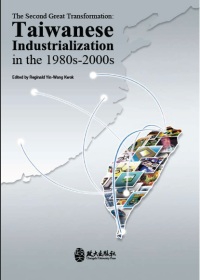- 定價650.00元
-
8
折優惠:HK$520

|
|
|
|
The Second Great Transformation: Taiwanese Industrialization in the 1980s-2000s
|

|

沒有庫存
訂購需時10-14天
|
|
|
|

|
|
9789866475115 | |
|

|
|
Reginald Yin-Wang Kwok/編著 | |
|

|
|
政大出版社 | |
|

|
|
2011年4月01日
| |
|

|
|
150.00 元
| |
|

|
|
HK$ 142.5
|
|
|
|
|

| |
|
|
|
|
| |
|
|
詳
細
資
料
|
* 叢書系列:政大出版圖書
* 規格:平裝 / 366頁 / 普級 / 單色印刷 / 初版
* 出版地:台灣
政大出版圖書
|
|
分
類
|
人文史地 > 中國史地 > 其他 |
同
類
書
推
薦
|
|
|
內
容
簡
介
|
Reginald Yin-Wang KwokProfessor of Urban and Regional Planning, University of Hawaii at ManoaJung-Ying CHANGAssistant Professor of Graduate Institute of Urban Planning, National Taipei UniversityYi-Fong CHENAssistant Professor of Graduate Institute for Taiwanese Ethno-Development, National Dong Hwa UniversityChia-Ho CHINGProfessor of Urban Planning, National Taipei UniversityTsu-Lung CHOUProfessor of Urban Planning, National Taipei UniversityChu-Joe HSIAProfessor of Graduate Institute of Building and Planning, National Taiwan UniversityLi-Ming HSIAProfessor of Regional Policy and Development, National Taitung UniversityJinn-Yuh HSUProfessor of Department of Geography, National Taiwan UniversityTe-Chuan LIAdvisor of Taipei County Government and PhD student of Urban Planning, National Taipei UniversityJi-Ping LINAssociate Research Fellow of Research Center for Humanities and Social Sciences, Academia SinicaLe-Xin LINMaster of Science in Graduate Institute of Building and Planning, National Taiwan UniversityYu-Chun LINAssistant Professor at Department of Social Development, National PingTung University of EducationShih-Ying TSAIPhD student of Urban Planning, National Taipei UniversityJenn Hwan WANGChair professor of Graduate Institute of Development Studies, and Director, Center for China Studies, National Chengchi UniversityEthan YougasonAdjunct Assistant Professor of History and International Cultural Studies, Brigham Young University of Hawaii
|
|
目
錄
|
theme of this book is to review the diversity of regional transformation and industrial restructuring in Taiwan industries in 1980s-2008. The structural frame and theoretical guide for investigation have three contextual sets: the global industrial integration, the cross-strait political economy, and post-development state intervention. Global production is the basis for cross-border production networking. Cross-state political economy, induced the state’s concern of dependency, sets up political hostility across the strait. Post-developmental state intervention supports the ascending tendency in global value chains for Taiwan’s industries, and promulgated anti cross-strait investment regulations. These context sets for industrial development provide a coherent analytic structure for studying Taiwan’s industrial organizational adjustment and spatial restructuring. How industries were reorganized transformed and production regions were re-formed are the foci for empirical studies. This volume is divided into five parts with ten chapters.w The first part gives the general regional characteristics resulting from Taiwan’s political economy in 1980s-2008. The two chapters illustrate the economic and the political spatial consequences of the cross-strait effects. w The second part reviews the key factor for the evolutionary changes in Taiwan’s production regions, with a chapter each on the historical and present regional formation. w The third part explores two state supported industries - the well-established information and communication technology industry and the emerging software industry. w The fourth part examines the cross-strait production region formation of two un-assisted industries - the bicycle industry and the Mandarin pop music industry. w The fifth part investigates an industry and one region, both of which are little affected by the cross-strait effects. A rural district of hosiery production and the Eastern Taiwan region resists cross-strait migration, but for different reasons.This book gives an up-to-date insider’s reports and commentary and seeks explanations beyond the rationale of globalization alone. Taiwan’s cases of industrial global expansion provide a greater vista to our understanding of industrial strategies and production networks. By expanding the scope of research, it exposes the nuances of Taiwan’s industrial restructuring and network coordination, the how and why they differ from each other.
|
|
|
書
評
|
|
|
|
|

